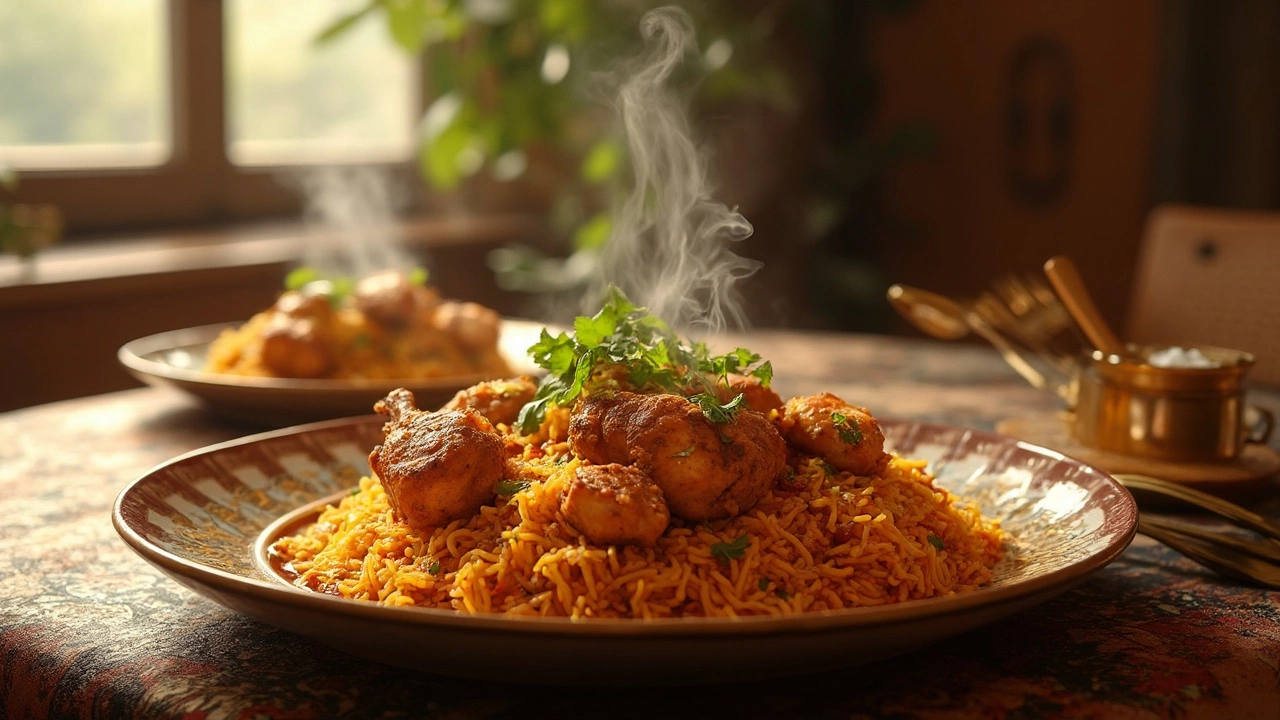Ever wondered why the chicken in biryani at your favorite restaurant is always so tender and juicy? Let's get real—no one wants chewy chicken in their delicious biryani. The secret lies in a few simple tricks that can be done at home.
First off, think about the type of chicken you’re using. Fresh chicken always beats frozen when it comes to tenderness. Go for skinless, boneless thighs; they carry more fat, retaining their tenderness better than the drier breast parts.
Now, let's talk marination. It's not just about flavor—proper marination can soften the meat significantly. Yogurt is your best friend here; its acidity helps break down the proteins, making the chicken tender and juicy. A mix of yogurt with spices like turmeric, garlic, and ginger can penetrate the chicken, ensuring every bite is a flavor bomb.
Next, we need to address how you cook it. Slow and steady wins the race. Cooking chicken on a low heat helps it retain its moisture, preventing that awful rubbery texture. Do you often brown it first and then let it simmer with the rice? Perfect! This two-step process not only enhances the flavor but keeps the chicken meltingly soft.
Selecting the Right Chicken
When it comes to making your biryani unforgettable, choosing the right chicken is crucial. You might think, "Chicken is chicken," but let's clear that up right away.
First, fresh is best. If you have the option, always pick fresh over frozen. Fresh chicken has a better texture and is free from any freezer-burn flavors, ensuring your biryani tastes just right.
What Cut Works Best?
If you want the meat to stay soft, your go-to choice should be skinless, boneless thighs. They boast a higher fat content compared to chicken breast, which helps in keeping the meat juicy and flavorful. On the other hand, chicken breast can become quite dry, making it a less ideal choice for biryani enthusiasts.
The Age Factor
Did you know the age of the chicken matters too? Younger chickens tend to have more tender meat, which is perfect for biryani. Look for labels like "young" or "spring chicken" as these are usually tenderer than their older counterparts.
Organic vs. Conventional
You might also wonder about organic versus conventional chicken. Organic chicken typically means fewer additives and hormones, which is not only a healthier choice but can impact flavor and tenderness too.
Remember, selecting the right chicken is the first step towards a successful dish. Keep these pointers in mind, and you’ll be a step closer to enjoying that restaurant-style tender chicken in your homemade biryani.
Marination Techniques
Marination isn't just about the flavor, folks. It's a pivotal step in achieving tender chicken for your biryani. The right marinade can work its magic overnight, turning tough meat into melt-in-your-mouth goodness.
Key Ingredients for a Great Marinade
First on the list is yogurt. Why yogurt? Its natural acidity acts like a gentle tenderizer, breaking down those tough proteins. Make sure to use a full-fat variety for best results. It's not just about softening; it clings well to the chicken, ensuring even flavor distribution.
- Turmeric: Adds color and a touch of earthy aroma.
- Ginger and Garlic Paste: These two are power-packed with enzymes and flavors. They also help in tenderizing.
- Sugar: Just a pinch helps in caramelizing the chicken, adding a slight sweetness without overpowering the other flavors.
Steps to an Effective Marinade
- Mix these ingredients in a bowl: 1 cup of yogurt, 2 tablespoons of ginger-garlic paste, a teaspoon of turmeric, salt, and a pinch of sugar.
- Ensure chicken pieces are coated evenly. This uniformity helps the chicken maintain its softness when cooked.
- Cover and let it rest in the fridge for at least 4 hours, but overnight is even better. Patience is key here.
For those of you who love experimenting, try adding a bit of lemon juice or vinegar. These not only enhance flavors but work with yogurt's acidity to further soften the chicken. But be cautious—not too much, or you're risking mushy chicken instead of tender.

Cooking Methods
When it comes to making the chicken in biryani soft and succulent, the way you cook it is crucial. Let's break it down: the goal is to cook the chicken long enough to bring out all the flavors without drying it out. Here’s how you can achieve that:
Start with a Sear
Brown the chicken before simmering. This not only locks in juices but also adds a lot of flavor. Heat a little ghee or oil, enough to cover the bottom of your pan, and sear the chicken until it’s golden brown. This caramelizes the outside while keeping the inside tender.
Cooking Low and Slow
After searing, switch to a low flame. The key here is patience. Cook the chicken slowly in the masala mix, making sure it’s a part of the biryani layering process. This gentle cooking approach prevents it from getting rubbery.
Steam Cooking
Once your biryani layers are set, cover the pot with a tight-fitting lid or seal it with dough to trap in steam. Known as 'dum' cooking, this method lets the steam cook everything evenly, leading to juicy, softened chicken.
Watch the Time
Overcooking is enemy number one. As a rule of thumb, when the chicken is seared initially, aim for a total cooking time of around 30-40 minutes once it's layered with rice. Always trust your senses—if it smells done, it's likely ready.
Check the Temperature
If you're a kitchen gadget fan, a meat thermometer can ensure your chicken is cooked perfectly. Cook till it reaches an internal temperature of around 165°F (73°C), which is generally safe and tender.
Choose your cooking methods wisely, and you'll have that tender chicken that makes biryani a true delight.
Additional Tips
Alright, so you've got the basics down. If you're looking to level up your biryani game further, here are some cooking tips that can make your chicken even more delightful.
Use a Brine
Brining the chicken before marination can work wonders. Simply soak your chicken in a saltwater solution for 30 minutes to an hour. This helps the chicken retain moisture during cooking, ensuring it remains juicy. Make sure to pat it dry before marinating.
Watch the Marination Time
Marinating for too long isn't always better. While you think you're infusing more flavor, over-marinated chicken can turn mushy. Aim for about 4-6 hours in the fridge, which is usually enough to get that balance of flavor and texture.
Don't Overcrowd the Pan
When it's time to cook, avoid cramming the chicken pieces tightly together. Overcrowding means uneven cooking, which can leave some pieces tough. Give your chicken room to breathe for the best results.
Consider a Natural Tenderizer
Adding a natural tenderizer, such as papaya or pineapple, to your marinade can help break down those tough fibers. Just a tablespoon of puree mixed in can make a significant difference. However, use these sparingly as they are potent and can alter the taste if overused.
Avoid Overcooking
This might sound like a no-brainer, but sometimes in the quest for rich flavors, we end up overcooking. Use a meat thermometer if you're unsure—once it hits 165°F (75°C), you're in the clear.
| Tip | Benefit |
|---|---|
| Brining | Retains moisture |
| Natural Tenderizer | Breaks down tough fibers |
Remember, every step you take adds up to that perfect bite. With these tips in your toolkit, your chicken biryani can truly shine.
